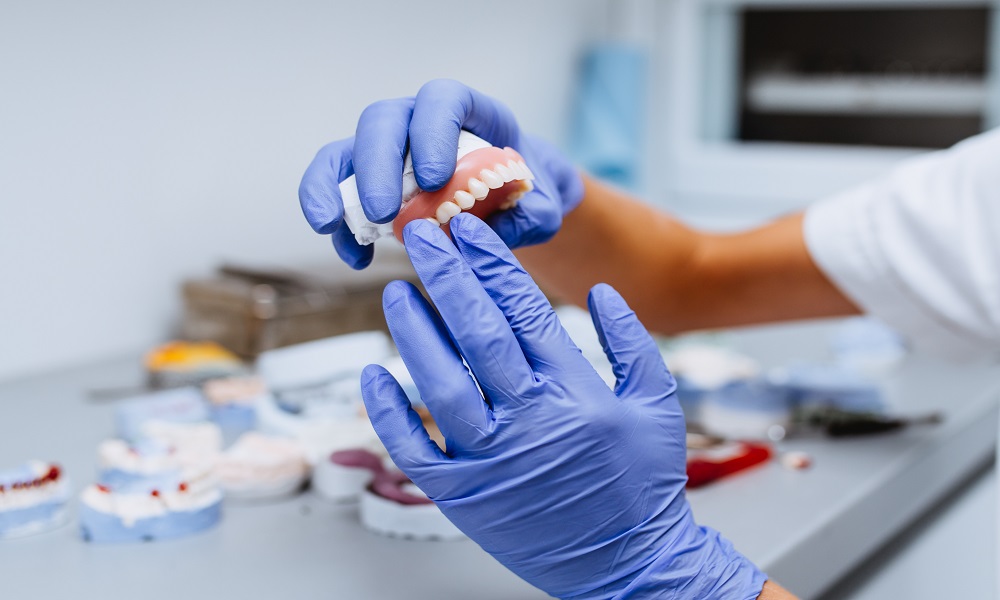A removable dental prosthesis called a denture is used to replace missing teeth. They can be created from various materials, such as porcelain, metal, or plastic. Dentures can be worn for different amounts depending on the patient’s requirements and are manufactured specifically to fit the patient’s mouth.
Patients should generally wear partial dentures for as long as necessary to regain their smile and oral health. However, there are certain considerations to make regarding the duration of wearing dentures.
How Do Partial Dentures Work?
Wearing a temporary partial denture is frequently required when getting a partial denture for your mouth. It stays in place until your last, fully functional partial denture is ready.
A partial denture’s base is frequently pink or stained to match your gums’ natural colour. Dentists often advise patients who still have one or more natural teeth in either their top or bottom jaw to get them. To improve the fit of the partial denture, the dentist may occasionally need to install crowns on your natural teeth.
Some dentists use precise attachments instead of clasps to better fit your teeth. They can cost more, but they often have a superior appearance. To determine which style would suit your mouth the best, discuss the possibilities for temporary partial dentures with our dentist.
What Happens If You Don’t Wear Your Dentures?
Your gums and jawbone may shrink if you stop wearing your dentures.
Simply chewing helps to activate the jaw and provide nutrient-rich blood to the area. When a tooth is gone, the surrounding jaw area is no longer stimulated, thus starving for nutrition.
The loss of jawbone and gum tissue might occur over time, which will make it more challenging to wear dentures in the future. Dentures are more than merely aesthetically pleasing. You can maintain good dental health by wearing them, so be sure to adhere to our dentist’s recommendations.
How Many Hours Should You Wear Partial Dentures?
The rule of thumb is that you should put on your dentures for at least 8 hours each day. This will give your jawbone and gums time to adapt to the dentures and prevent sore patches from forming. To give your gums a chance to relax, it is advised to remove them at night. Further, you should take them out when eating, drinking, brushing, and flossing.
When Should You Not Wear Dentures?
You shouldn’t wear dentures if you have an infection or sore gums. Additionally, it would help if you refrained from wearing them when you could expect them to sag, including during vigorous exercise. Dentures should not be worn when eating or sleeping, for example. Consult our dentist in NE Calgary if you need clarification on whether or not you should be wearing your dentures.
How Long Should You Wear Dentures for the First Time?
When you first start wearing dentures, some discomfort is common. Your muscles will need time to learn how to hold them in place, and your gums will need time to get used to the new fit. You should only use your dentures for brief periods for the first several days. Increase the time you wear them until you feel at peace all day.
Taking out your dentures at night is crucial to give your gums a chance to relax. Please keep them in a secure container like a denture cup to prevent damage. Make sure to use a soft-bristled brush and denture cleanser to clean your dentures every day.
What Happens If You Stop Wearing Dentures?
Your gums and bones will shrink and alter shape if you stop wearing dentures. Future denture use may become challenging or even impossible as a result. Additionally, without denture support, your facial muscles can be compromised. To keep your mouth healthy, you should wear your dental partial denture for as long as feasible. However, visit our dentist if you have issues with your dentures, such as pain or discomfort. They can alter it to make it fit comfortably.
Learn More at Totally Dental
Visit our neighborhood clinic if you have additional questions about dentures! You can get the best treatment for your smile with the aid of our knowledgeable staff. To set up a meeting with us, give us a call or send us an email to book an appointment.

